When you purchase an item after clicking a link from this post, we may earn a commission.
Devin: What is your superpower?
Jed: I guess my superpower would be what I understand Walter Brueggemann spoke about. I’m not sure; I’ve never actually read this, but I had heard it attributed to him—the whole notion of humbition. By humbition, I mean the idea that we should be hugely ambitious in the agenda that we seek to advance but approach the advancement of that agenda with a posture of humility.
Jed Emerson is one of the real O.G.s of impact investing. He conceived of and popularized “blended value” to describe seeking both profits and social impact. Today, he serves as the chief impact officer for Alvarium Tiedemann (AlTi).
Though he has been teaching the idea of blended value for decades, I asked him to recap its significance:
In the late eighties and the early nineties, I really moved out of traditional nonprofit work and into what's become known as impact investing. One of the things that really kind of helped me in that process was the realization that a lot of us were having very similar conversations with different people, all of whom thought they were having very different discussions, but all of which, to my mind centered on this issue of how we understand the nature of the value that we create.
I think that in traditional practices of nonprofit versus for-profit, we're asked to choose. We're asked to function within a bifurcated value proposition that says that you either make an investment or you make a grant, you work for a nonprofit, or you work for a for-profit. And I think many of us have come to conclude that that actually it's a both-and proposition that companies and businesses create social and environmental value and impacts and that nonprofits have economic worth, and that we really need to take a more integrated blended value approach.
His move to AlTi was motivated by a growing sense of urgency, spurred in part by the pandemic.
“We’re basically destroying the living planet in order to save ourselves and killing ourselves in that process,” he says. “That raises a whole host of issues in terms of how we interact with nature, how we think about the climate crisis—how we respond.”
“George Floyd’s murder, the rise of Black Lives Matter—all of this—raised serious issues for all of us,” Jed says. “For me, I’m 64; I started thinking about how I want to spend the next 5 to 10 years of my career.”
“We are running out of time,” he says. “If we are serious about the climate crisis, if we’re serious about social inequity, I do not think we have another 50 years to have conversations. We need capital at scale to respond, not necessarily answer, but to respond to the challenges that already are at scale.”
He concluded that it was time to move from his private practice, despite the significant influence he wielded from that seat, to find a way to have an even more significant impact. “We need more of us to be kind of going into the belly of the beast, if you will, and grappling with the challenge of what that means.”
“We need to really understand and explore and grapple really with the challenge of bringing those innovations into the mainstream so that as impact investing continues to scale, it does so with integrity, it does so with a focus and understanding of systems change as opposed to product offering and wealth accumulation,” Jed says.
In this work, Jed now employs a superpower he calls humbition, borrowing the term, he says, from Walter Brueggemann.
How to Develop Humbition As a Superpower
Jed has mastered the art of seeking to make change at scale while approaching problems humbly.
Things change and evolve, so what we think we know isn’t always true, even if earlier consensus suggested it was. “Answers and understandings of the world and reality and solutions evolve and change and shift, and what we understood to be true ten years ago, 20 years ago, 30 years ago, may look different today or from the way it will look tomorrow,” Jed says.
As urgent as things now are, many of the challenges we face are challenges humans have wrestled with for a long time. “Nothing that we are grappling with today is anything other than what humanity has grappled with for millennia,” Jed says. “We need to just calm down and not fall victim to the idea that simply because we’re the latest, that we’re the best and the smartest and the most talented.” That’s a serious dose of humility.
Jed’s perspective has changed over time.
When I think of who I was in my twenties and thirties, I probably would have thrown myself out of my own office in my sixties because I was very passionate. I thought I was very smart. I couldn't figure out why these older people who were in positions of power to create change would not listen to me and create the change that I thought we should advance.
Today, when I'm in meetings with colleagues, when I'm in meetings with prospective clients and with active clients, I'm trying to continually pause and simply be in that moment and hear what it is that that person is really stating what they're grappling with in terms of their issues and how are they showing up in the world.
We have to get to a place where you can almost lose yourself in that in order to dial back your internal voice, your own ego, your own ideas to really receive and understand what the other person is grappling with, what that other community is grappling with in order to be able then to make a contribution.
We can default into these oppositional places when the real solution, I hope, lies ahead of both of us. If we reorient away from “my position” to “our co-created solution,” that's really where we need to be directing our energies.
This is not a perspective that I had, again, ten years ago. I certainly did not have it 30 years ago. The last book that I wrote, The Purpose of Capital, which we spoke about. I could not have written that book ten or 20 or 30 years ago because it basically says we need to sit more deeply with the questions.
We need to reflect on what we collectively actually know as opposed to what I understand myself today. The righteousness of my ideas is not as important as the ability to influence and execute those ideas with others and a confidence that those ideas will shift and evolve and change as they see the light of day and as we move forward together.
By following Jed’s example and his advice for employing humbition, you can make it a superpower that enables you to do more good in the world.

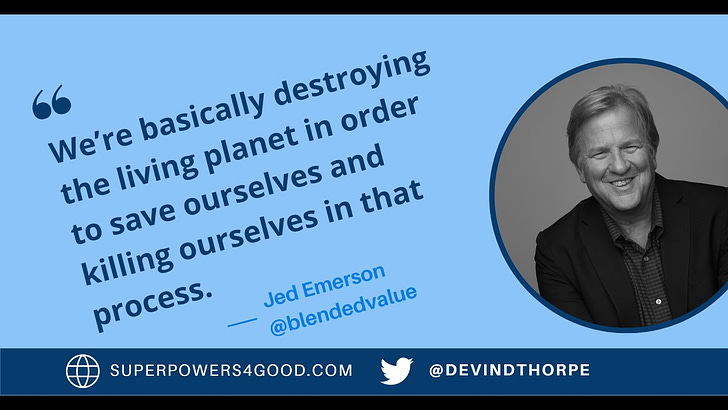


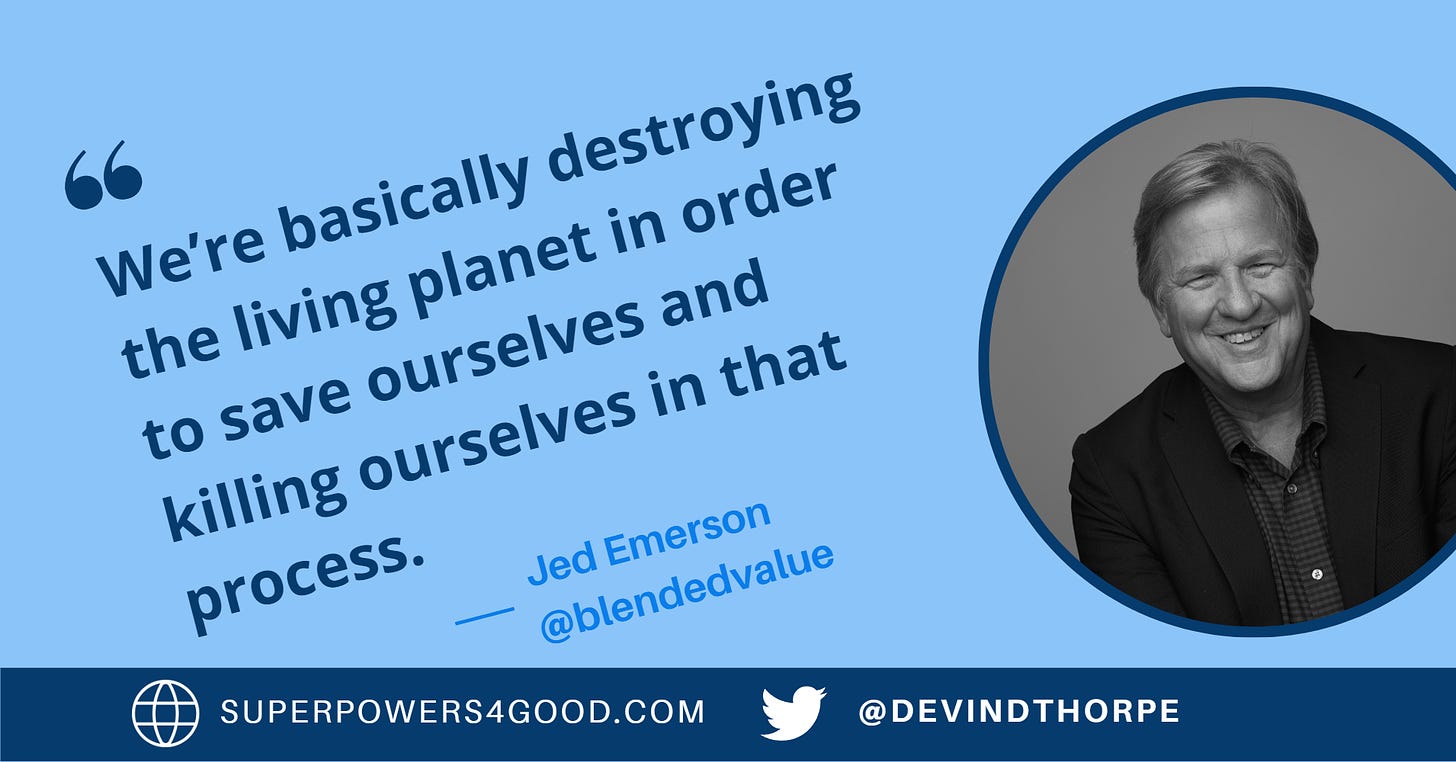
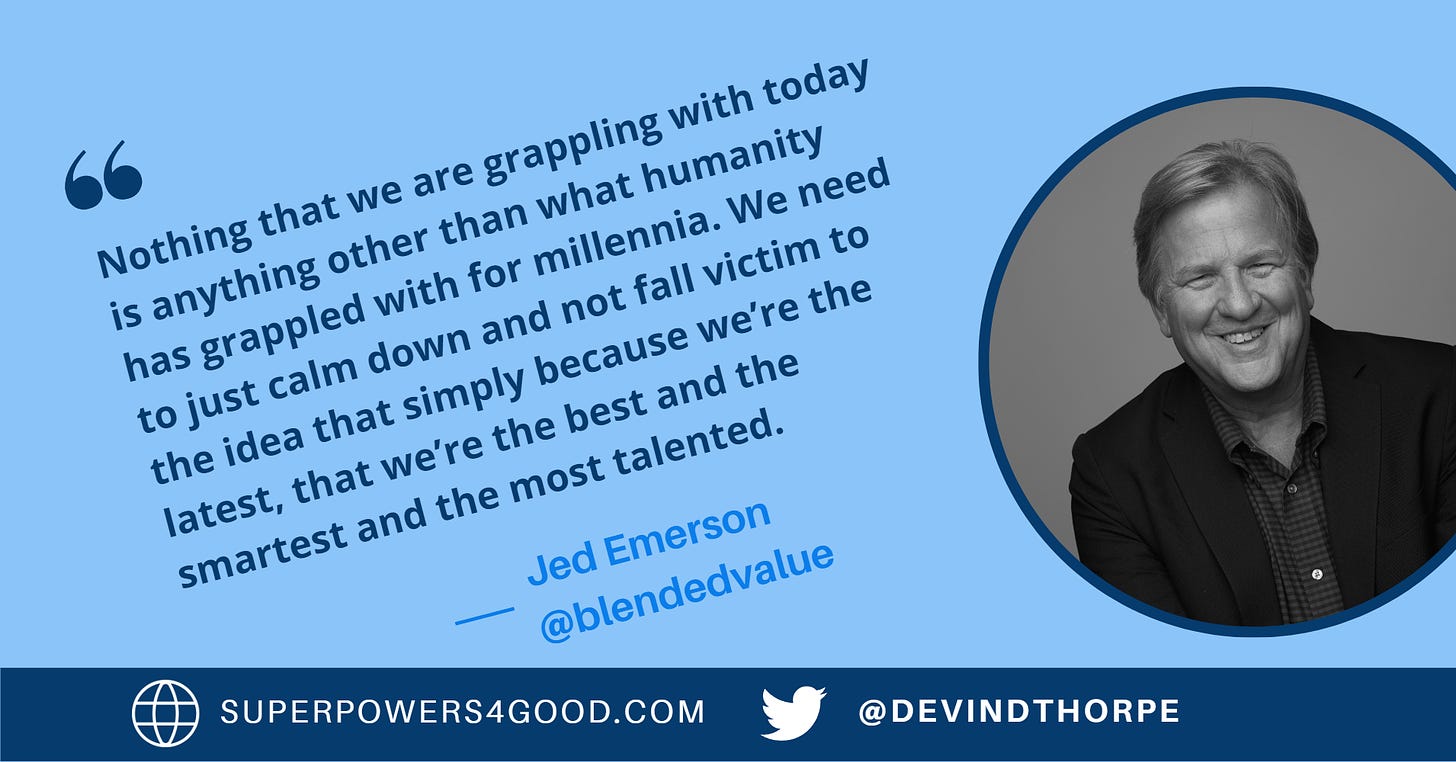



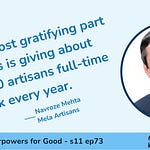











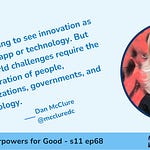


Leader Who Defined Blended Value Employs 'Humbition'